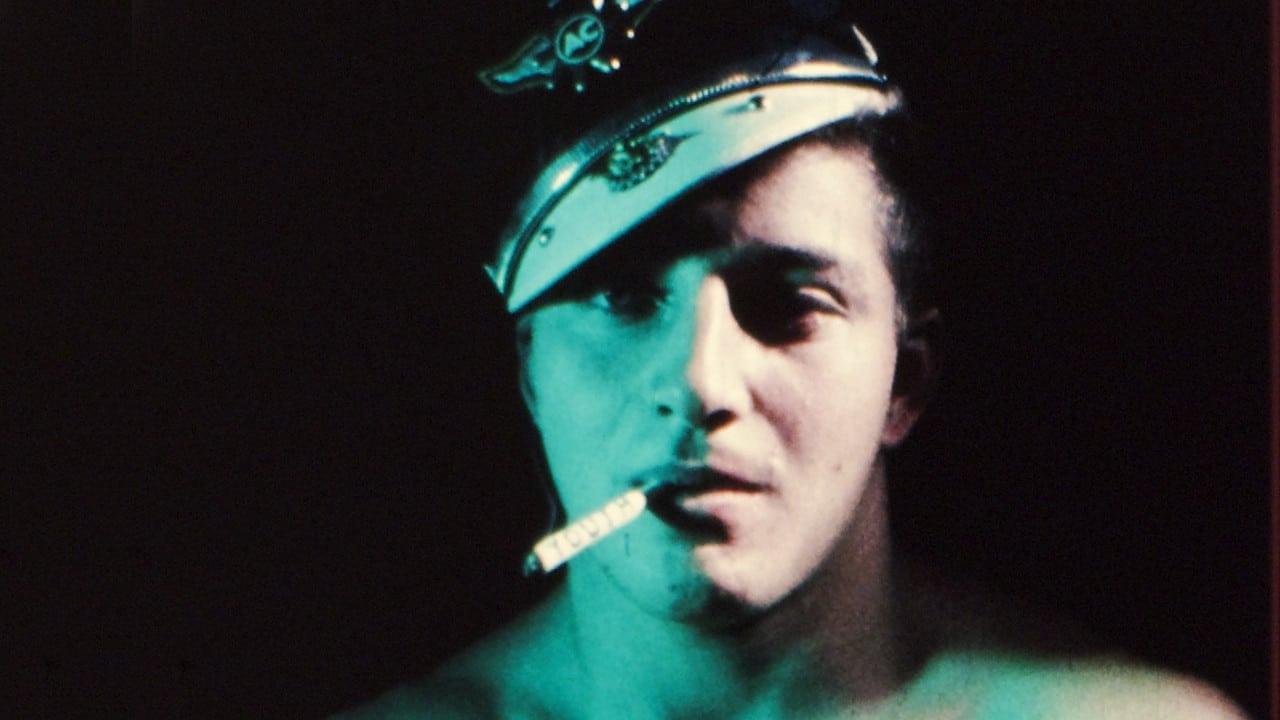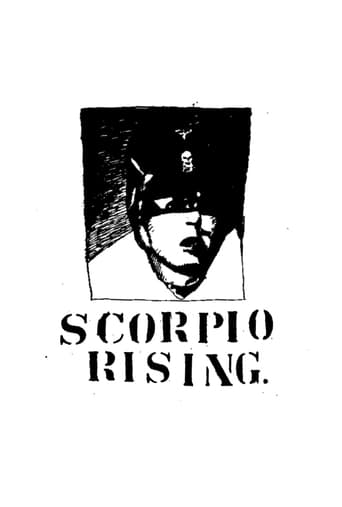

People are voting emotionally.
... View MoreIn other words,this film is a surreal ride.
... View MoreI think this is a new genre that they're all sort of working their way through it and haven't got all the kinks worked out yet but it's a genre that works for me.
... View MoreThe film may be flawed, but its message is not.
... View MoreAn influence on everyone from Scorsese to Lynch to Waters to most-music-video-directors-and-editors, 'Scorpio Rising' is one of the most important and revolutionarily inventive and subversive avant garde films of all time. Its content is edgy and over the top, and the film is filled to the brim w/obvious flaws and muddled messages, but all in all, it is one of my personal favorite films of all time. It was one of the first experimental films I ever saw, and the totally ironic usage of lighthearted pop songs juxtaposed w/the occasionally brutal and oft-deliberately-offensive-and-blashphemous-slash-sacrilegious content had a huge impact on me and the way I, myself, saw and made movies. So I owe a huge debt to Kenneth Anger and this film, even if, after quite a few rewatchings now, there are a few admittedly somewhat eye rollingly edgy moments, but, in the film's defense, it is important to acknowledge the time in which it was made and who exactly had made it. The "edginess" of the film isn't exactly the same brand of edginess an indie film that would contain some of the images in here would usually contain, as it was genuinely risky stuff to release back in the '60's. This film isn't afraid to intercut footage taken from some cheap and kinda cliche Sunday-school-style religious movie about Jesus w/some punkish occultist Neo-Nazis getting ready to wreak havoc and cause violent and sexual troubles (either respectively or not, depending on the individual wreaking the havoc, I guess), this film isn't afraid to be intentionally over-the-top homoerotic and practically worship the hunky male form, this film isn't afraid to show nudity or weird pervy sex acts or any of that. It is fearless and perhaps a bit ridiculous, but an important staple of experimental cinema and just plain old cinema in general.
... View MoreI know I'm not the first person to point this out, but I'm fairly certain without this uncanny, sort of experimental short film (I say 'sort of' since it's experimental mostly in it having a lack of a clear story and definable characters, but more on that just a moment), we wouldn't have Martin Scorsese. It may seem obvious to some, but it's confirmed when reading the book of interviews he did with Richard Schickel several years ago, when he recalled seeing the film when it was first released - in an underground format, as it was that kind of picture, on someone's rooftop or in a basement or other - and that it really made an impact that he couldn't articulate.Seeing this today it's somewhat easy to see why: the rock and roll music, the emphasis on montage that cuts in flow and sync with the image, and how the image of a man is based on how he looks (we see in Mean Streets and Taxi Driver how a man looks will define him, both in clothes and in style, i.e. Travis Bickle or, on the comedic side, the awkardness of Pupkin). There may have been some influence on Lynch too, if only through the 'Blue Velvet' song, though somehow, someway, I think Anger comes away with using the song in a more iconic way: a soothing tale of a woman putting on and being beautiful in a dress juxtaposed with a man putting on his jeans and jacket and being in front of the camera like 'yeah, what?' It's probably in a mocking tone that Kenneth Anger shows his figures in biker garb, and yet it's hard to tell exactly what the intention is. This is not a bad thing; the way it's presented different people will take away different aspects. If it is satirizing the culture of rebellion it's that it's like, 'well, this guy thinks he's tough and manly and yet wait until that erect genitalia comes out' (and if you look close enough it's not hard to miss, no pun intended).The majority of this film is really about its style, if that makes sense. The first 16/17 minutes is simply seeing set up. We don't know what for since there are no characters and there's no dialog: the soundtrack is made up of songs (really great ones by Elvis and Ray Charles and Martha and the Vandellas and the Crystals and so on) and sometimes the sound of motorcycles revving up. So it's all about ritual - how to put together the bicycle, how a little kid (who is only there briefly) plays with his toys, and how the men put on their jackets and rings and stand in front of the camera like any moment they might just start masturbating to their own image. As if by some happenstance as well (according to Anger this was a coincidence by some miracle) The Wild One is on TV, which lends this to being akin to Godard's Breathless as far as figures trying to attain their ideal images.Only this isn't Brando; these bikers are, I think gay Nazis(?) It's hard to tell exactly, but then the substance in this case *is* the style. I'm still pondering over what the religious symbolism means as well, as Anger cuts in shots from some other black and white film showing Jesus (I think it's him, he had the beard and all). Is this meant to be mocking as well, as if to say 'well, you think YOU got a crew?' This was lost on me as I was watching it, but it's fine to think about it later on too.The whole experience of Scorpio Rising is just one of total fascination. There's nothing as far as there being a concrete story - maybe there is one and I just missed it - but as far as simply showing us things, it's an excellent example of how to marry image and music. Without the songs this wouldn't really be all that much, just a lot of well-shot but randomly and at times very wildly cut together images of male perversity and hedonism (and sometimes just showing us shots of bikers riding around is simple). But you get the sense that in a weird way this is almost like a documentary of how men who go into the world of dangerous rebellion see themselves, and to go one further how if you do happen to be a gay nazi motorcycle man who gets in leather and rides around and does things with other men... well, do these guys even exist? Probably, or probably not.For Kenneth Anger there's some satire to mine in the ritual of getting ready, the image of over-hyper-WTF-masculinity, and how far the world of Marlon Brando and his "What are you rebelling against" "Whaddaya got?" can go. It's sophisticated and daring and campy and deranged, and it feels still fresh today in its craft that it almost doesn't feel like it's from 1964, rather that it's from the 1990's and it's looking back at that period - it's post-modern to the core.
... View MoreI am a bit surprised this movie, which was written by Ernest D. Glucksman, the producer from quite a few Jerry Lewis comedies, has become a bit of a cult classic. I'd understand if that was only the case for people from the biker scene, but beyond that I can't really see a reason why people would enjoy watching these slightly over 28 minutes. Nothing in this movie warrants such a running time.It's nothing more than a few (gay?) motorcycle bikers preparing for their rides and afterward we see these rides depicted. The only thing that kept me from stopping was, besides the hope it could get better, the music. It features a couple classic songs like Blue Velvet, Elvis and a couple more that made it easier to sit through. The hope was disappointed and besides the music (of course I simply could have listened to an old record as well for that experience), I can't really see any redeemable qualities that make it better than Kenneth Anger's recent work including the panned "Anger sees Red". I surely prefer his other Rising film from the early 70s, Lucifer Rising, mostly for the Egypt-related Isis&Osiris-scenes although I'm not exactly a big fan of that one either.
... View MoreKenneth Anger's "Scorpio Rising", set to the tune of thirteen 1960's pop songs, ranks as one of the best films ever shot in the experimental genres, which to some people might translate as the best pile of dog poop ever made, but in terms of visual imagery, context, and use of music, it ranks up there as one of the most important films of the 60's. Kenneth Anger's trademarks (outsider as protagonist, homosexual iconography, pop culture looked at in a different light) are at their most poignant here with most memorable scenes set to 'Blue Velvet", "I Will Follow Him", and "Wipe Out". Also classic is the use of clips from Cecil B. DeMille's "King of Kings" of Jesus and his disciples walking superimposed between shots of gay bikers. A classic piece of Americana.
... View More